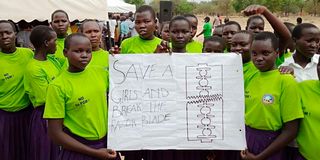Alarm over low enrolment of girls in Pokot Central schools

Adurokoit Girls Secondary School students during an anti-FGM and early forced marriage sensitisation ceremony in the Tandapos area of West Pokot. Pokot Central Sub-County is reporting low enrolment of girls in schools due to harmful cultural practices, insecurity and poverty, officials have said.
What you need to know:
- West Pokot County has an illiteracy level of 67 per cent, which is blamed on harmful cultural practices such as female genital mutilation and child marriages.
- Some 800,000 children are out of school, according to a 2023 report by Unicef.
Pokot Central Sub-County is reporting low enrolment of girls in schools due to harmful cultural practices, insecurity and poverty, officials have said.
West Pokot County has an illiteracy level of 67 per cent, which is blamed on harmful cultural practices such as female genital mutilation and child marriages. Some 800,000 children are out of school, according to a 2023 report by Unicef.
In Pokot Central, most schools in far-flung areas that border neighbouring counties are hard-hit. They include Cheptulel Boys, Chesegon Primary, Cheptulel Primary, and Father Leo Staples Girls Secondary School.
Ms Eunice Lopus, Father Leo Staples principal, said her school has only 140 learners. “Parents find it hard to bring children to school because of poverty. Other parents have not embraced education for girls. We call on well-wishers to help,” she said.
She said insecurity and hunger due to drought prompts learners to run away. “Parents migrate from one place to another. One time you have learners and another time they are gone,” she said.
Retention measures
But Sub-County Education Director Kennedy Machacha said measures have been put in place to retain learners in school through a school feeding programme.
“We have given out food to schools and children are eating. We now have 35 secondary schools from 22 and 151 primary schools from 120 in the sub-county,” he said.
Sub-County Police Commander Nelson Omwenga urged parents to take their daughters to school. “We don’t want girls to be married off to older men in exchange for cows,” he warned, further calling for peace.
Assistant County Commissioner Naftali Kipkorir said the drop in enrolment of girls is due to insecurity. “As a government, we have put measures in place to deal with the challenges. We’ll deal with early pregnancies and the dropout problem.
“We are not happy about the [low] enrolment of girls. We want parents and chiefs to help us bring children to school,” he said, adding that nongovernmental organisations are sensitising the community to the significance of girls’ education.
Sigor MP Peter Lochakapong appealed to parents to prioritise girls’ education, too. “A girl is well placed to bring development to the region. Those who give priority to boys over girls should change. Girls should not go and look after animals and bring wealth in the form of [reverse] dowry. The girl will get married after one is given 10 cows but end up suffering,” he said during a visit to Father Leo Staples.
He added there are many opportunities for girls. “You can still get money after the girl is educated. I have been asked to give an engineer girl to join a board of roads but have not got one. We were even looking for a girl with a C minus and failed.”
He noted that the challenges have affected the education standards in the region. “I have donated six school buses courtesy of the Constituency Development Funds, given out bursaries and set up many schools,” said Mr Lochakapong.





